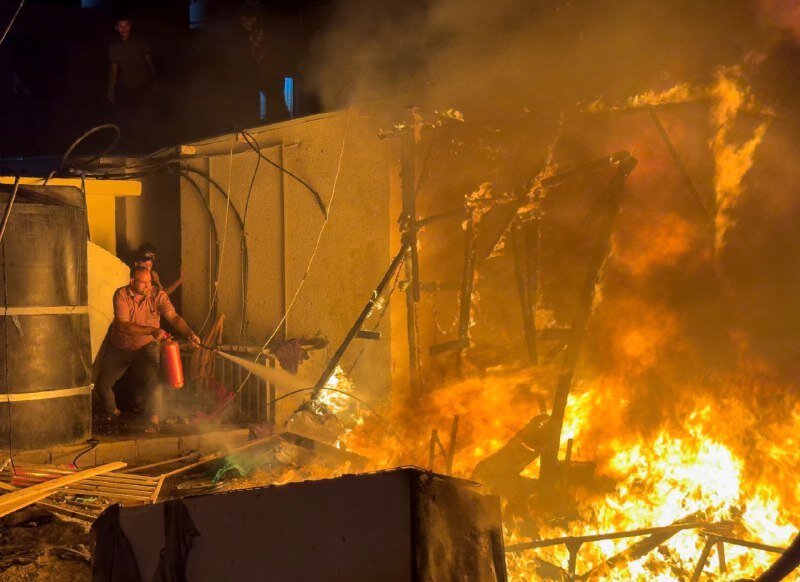Shielding the criminal
Unpacking E3 calls on Iran to refrain from attacks against Israel to help with a “ceasefire” in Gaza

TEHRAN – If you were someone who has been completely unaware of the events in Gaza over the past 10 months, you might read the recent joint statement by France, Germany, and the UK and conclude that Iran is responsible for the devastating humanitarian toll in the enclave, as well as the fact that West Asia now stands on the brink of war.
The statement was published on Monday after the United States along with Qatar and Egypt called on Palestinians to resume ceasefire talks as of August 15. Europeans express in the statement that they are worried Iran may scupper new attempts to establish peace in Gaza.
“The fighting must end now, and all hostages still detained by Hamas must be released. The people of Gaza need urgent and unfettered delivery and distribution of aid,” the statement read, adding, “In this context, and in particular, we call on Iran and its allies to refrain from attacks that would further escalate regional tensions and jeopardize the opportunity to agree to a ceasefire and the release of hostages. They will bear responsibility for actions that jeopardize this opportunity for peace and stability.”
The French President, British Prime Minister, and German Chancellor were referring to the anticipated Iranian retaliation against Israel, which is expected following the regime’s assassination of former Hamas Political Chief Ismail Haniyeh on Iranian soil on July 31. Leader of the Islamic Revolution Ayatollah Seyyed Ali Khamenei has vowed to avenge the blood of Iran’s “dear guest” – a promise that’s been reiterated by multiple high-ranking Iranian dignitaries in the past days.
What the three European leaders didn’t think to address in their statement was the fact that Israel has killed over 40,000 Palestinians in an area it has completely besieged and that Israel is the one escalating tensions to unprecedented levels by carrying out terrorist attacks in Tehran and Beirut. Shockingly, the statement makes no mention of Israel whatsoever.
“The statement's intention is not to promote a ceasefire, but rather to support Israel,” Abbas Aslani, an expert on West Asia, told the Tehran Times. “By asking Iran and its allies to refrain from responding to Israel, while Israel continues its offensive actions, the European trio is essentially condoning Israel's behavior. This support for Israel is not conducive to peace in the region and emboldens the Israeli regime to commit more terror acts in the future.”
Israel will not allow a ceasefire
The E3 statement also avoids the elephant in the room: There is still not a ceasefire deal on the table, because Israel doesn’t want that.
Israel’s aversion toward a ceasefire appears to be something Egypt, a mediator in talks between Zionists and Hamas, has picked up on way earlier than the West. The regime’s killing of over 100 Palestinian civilians, who were sheltering in a school in embattled Gaza, two days after the call on Hamas to re-engage in talks seemed to knock some sense into Egypt on Saturday.
“The deliberate killing of these huge numbers of unarmed civilians is real evidence of the absence of political will when it comes to the Israeli side,” the Egyptian Foreign Ministry said after footage of body parts and bloodied corpses scattered across the Al-Tabieen school surfaced on media.
Experts also believe that a Gaza ceasefire in the near future is unlikely. Vahid Khazab, a history researcher and analyst on Resistance forces, notes that Israeli Prime Minister Netanyahu needs to achieve some of his stated goals in the war before he will announce an end to it. "Some of his conditions for a ceasefire are considered to be Hamas’ redlines, like control over the Philadelphia Route and the ability to veto Palestinian releases," Khazab stated. "Some of Hamas’ conditions have also been rejected by Israelis in the past. So, I don’t think the upcoming round of talks would bear any results."
Khazab added that the Israeli Prime Minister is likely maintaining the current state of war to achieve his objectives through means other than military action. He explained, "Ten months in Gaza have not brought Israelis much success. So, the regime has now turned to its forte of assassination and intelligence-based acts, to achieve some outcomes."
